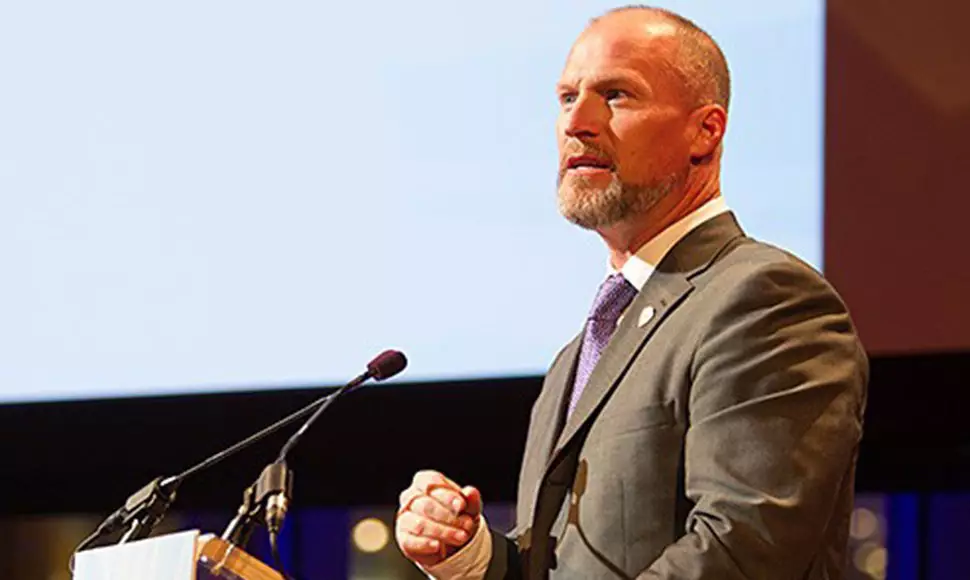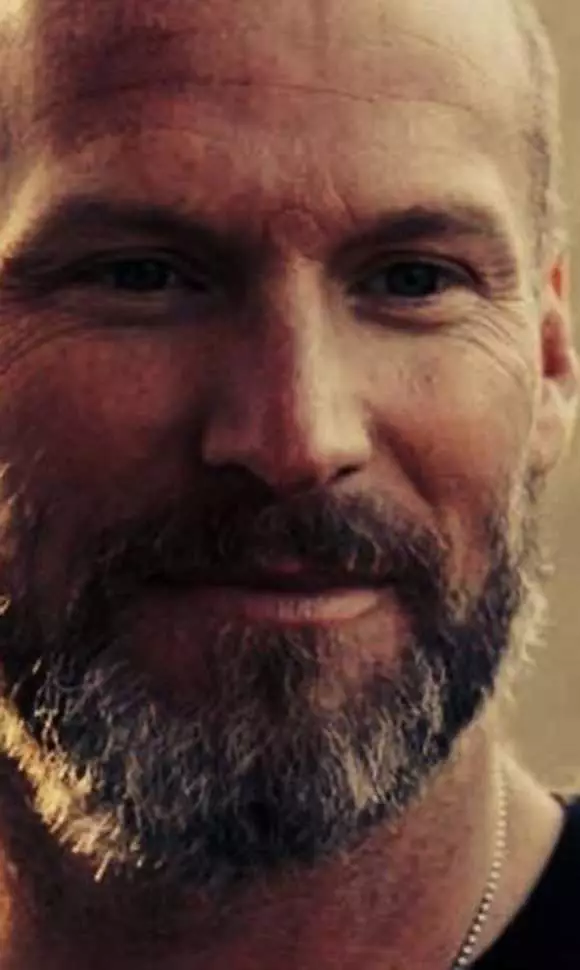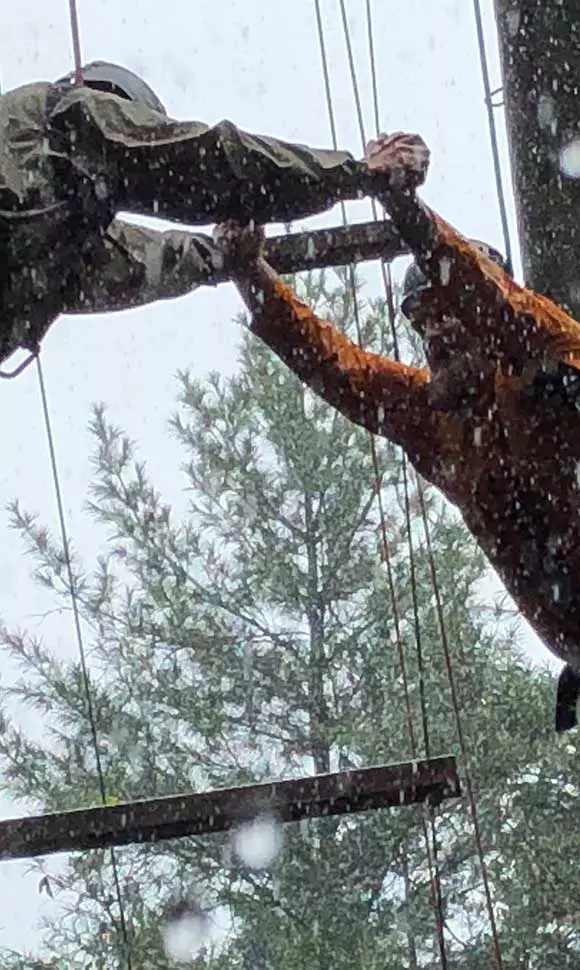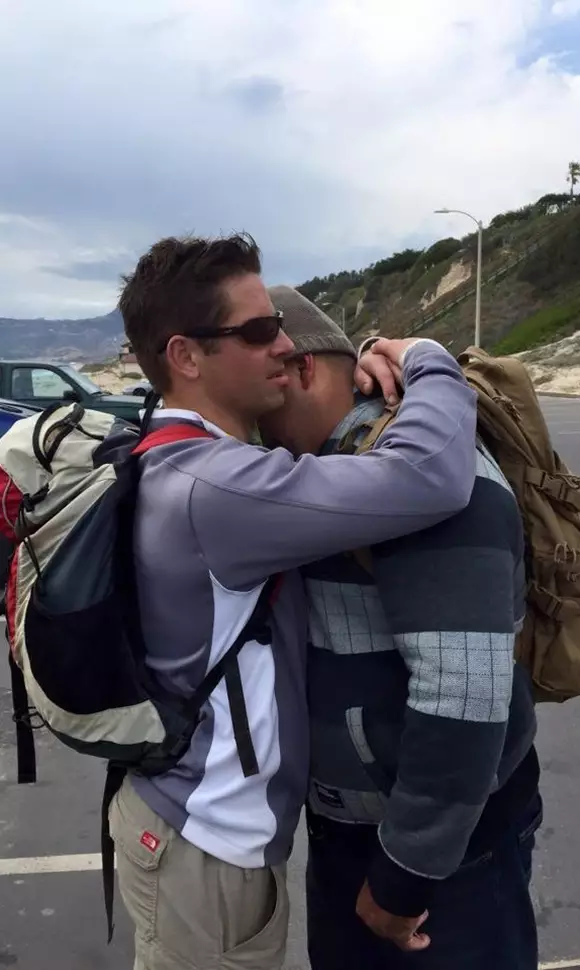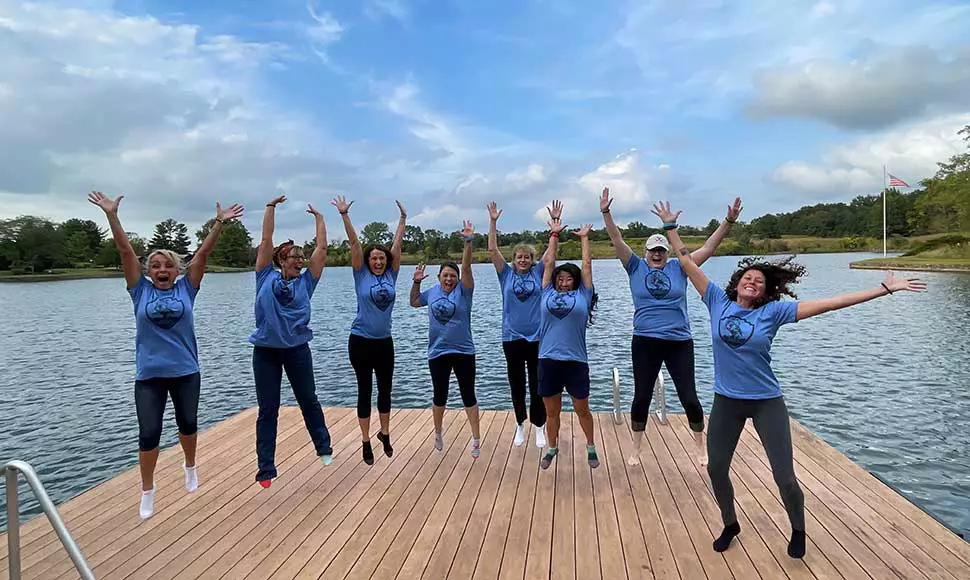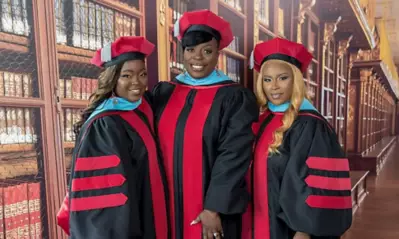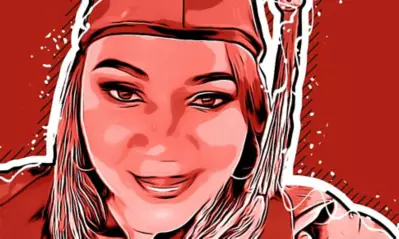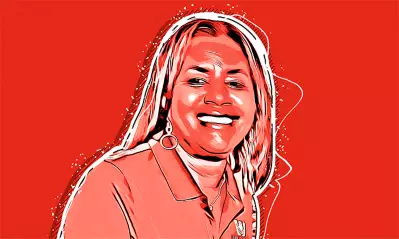Discover more stories in our Alumni Chronicles Magazine!
Fighting the good fight: How Jake Clark is saving one warrior at a time
ÔÇ£The cure is always painful; relief is always temporary. We are a relief-seeking culture writ large.ÔÇØ
This may sound cynical but, like most of what Jake Clark says, thereÔÇÖs a wisdom to it that stays with you. Some of ClarkÔÇÖs sagacity stems from his experience founding and operating Ôäó, an organization that helps military veterans and first responders cope with and suicidal ideation. Some of it comes from his own extensive life experience as a soldier, a police detective and a special agent for the FBI.
But more important than the ÔÇ£howÔÇØ or the ÔÇ£whyÔÇØ of this ░«╬█┤½├¢ (UOPX) alumnusÔÇÖ insight is the way he applies it to transform the lives of military veterans ÔÇö and perhaps even his own along the way.
Defying a legacy
╠²
By ClarkÔÇÖs own admission, his success is a surprise. His childhood was fraught with instability. He spent two and a half years in an orphanage when his parents couldnÔÇÖt care for him. He spent weekends visiting his mother in mental institutions when she was being treated for paranoid schizophrenia. And, according to Clark, his╠²╠²(ACE) score is ÔÇ£like a 9 out of 10.ÔÇØ╠²(For those unfamiliar with the ACE study, a higher score correlates with more trauma and greater likelihood of health problems in adulthood.)
ClarkÔÇÖs is a sobering history.╠²
Not surprisingly, demons followed him into adulthood. ÔÇ£My entire life strategy was organized around self-hatred,ÔÇØ Clark explains. He struggled with addiction and codependency even as his professional life followed an upward trajectory.╠²
ClarkÔÇÖs resum├®, for example, has some impressive highlights. He joined the U.S. Army right out of high school, and he worked as a Secret Service officer, police officer and, later, criminal investigator in Los Angeles. After 9/11, he reenlisted in the California Army National Guard and was deployed to Kosovo, where he saw firsthand what it means for a society to recover from a genocidal conflict.
His resum├® doesnÔÇÖt include everything, though. There was, for example, his commitment to education. He went back to school to earn his bachelorÔÇÖs degree from UOPX while he was working for the LAPD.
Then there was the time when he worked as a security detail for a certain A-list actor.
But perhaps most importantly, there was his encounter with a childhood acquaintance, a woman whose son had joined the military, deployed to Afghanistan and was accused of significant misconduct during his tour. The mother reached out to Clark for help.
ÔÇ£The reason I felt compelled to extend myself was that she had kind of involved me from the beginning,ÔÇØ Clark says. He admits that guilt fueled part of his response: He had been unkind to the mother when they had been kids, and he wanted to make amends.
He met with the son and, despite the gravity of the accusations, Clark felt compassion for him. ÔÇ£I remember what it was like being 19 years old and that immature.ÔÇØ
The birth of a servant leader
The meeting with the young soldier dovetailed with ClarkÔÇÖs experiences in Kosovo and an alarming suicidal trend he noticed among returning veterans. The number of veteran suicides reported is staggering: Approximately 18 veterans daily, which is .
All of this clicked for Clark, who traces his interest in mental health back to his childhood experience with his motherÔÇÖs illness.
╠²
I was just gobsmacked by all the suicides, Clark says, but then I came to find out that, throughout recorded history, warriors coming back from war struggled mightily with moral injuries.  This is nothing new. Its just that we live in a hyperconnected world. Were so isolated socially and so connected digitally that we know everything about each other, or at least we report that we do.
ClarkÔÇÖs concern, and his lifetime of study and service, eventually came together to address veteran suicides when he founded╠²╠²(SAW) in 2012. Clark is not a medical professional, and SAW is not a medical treatment facility. Rather, it is a destination guided by both timeless wisdom and modern science to achieve one mission: transformation.
The evolution of Save A Warrior
The scale of this statement, like so much of what Clark himself says, is intentional. SAW doesnÔÇÖt just intervene to save a life, although that is a big part of it. Rather, Clark and his team have developed a 72-hour, that draws on multiple disciplines and traditions designed to reframe each participantÔÇÖs worldview. Clark likens it to disruptive innovation theory, which is used in business, except that SAW has lifted elements from Zen Buddhism, 12-step recovery programs, neurobiology, metaphysics, depth psychology, psychiatry and ritual ceremonies to develop the SAW experience. (Again, these disciplines are applied not in a clinical setting, but in a programmatic one.)
ÔÇ£When the Greeks came home from Troy, there was no VA,ÔÇØ Clark says. ÔÇ£What they discovered through Aristotle was a narrative device called psychodrama, and that began Greek tragic theater.ÔÇØ (In case youÔÇÖre wondering, there are elements of that in SAW too.)
The purpose, Clark explains, is to present such an immersive and new experience that it upends everything participants assume or believe to be true. Clark acknowledges this can be jarring, but it is also transformative.
ÔÇ£If you took the 100 best psycho-spiritualist minds, threw them in a blender and distilled it, youÔÇÖd get Save A Warrior,ÔÇØ he says.
╠²
╠²
SAWÔÇÖs holistic approach is particularly effective for the people Clark helps. He says they often have unresolved childhood and/or developmental trauma combined with ÔÇ£moral injuryÔÇØ from their adult careers in the armed forces or as first responders. Moral trauma may stem from workplace trauma, combat trauma, military sexual trauma, polytrauma and survivorÔÇÖs guilt, among other kinds.
The result is a group of people grappling with complex post-traumatic stress, which often presents with chemical and behavioral addiction.
ÔÇ£By and large, I see the same person over and over and over again,ÔÇØ Clark says. Everyone is looking for relief. What Clark offers is the cure.╠²
Finding a way forward
The effects of SAWÔÇÖs program are profound. Clark estimates SAW has helped upward of 1,625 people since its inception. Participants arrive, perhaps skeptical, perhaps wary of anything too ÔÇ£patchouli,ÔÇØ as Clark puts it. But it isnÔÇÖt long before the program begins to work its magic.
ÔÇ£A person really gets complete in their life in the areas where theyÔÇÖre incomplete, usually with their relationships,ÔÇØ Clark says.
All of this takes place on two well-appointed campuses, one in Ohio and one in California. The lakefront Ohio campus features trails, a labyrinth, a meditative garden and expansive facilities where participants engage in a range of activities, including a 20-minute trademarked meditation. At the conclusion of the on-campus program, they receive a 500-day program to implement on their road to recovery.
╠²
Most people leave transformed, Clark says. Some donÔÇÖt, like the young man whose mother Clark knew as a child. The program was ÔÇ£completely lost on him,ÔÇØ Clark says. But even this is part of the deal.╠²
ÔÇ£I pray for them,ÔÇØ Clark says. ÔÇ£IÔÇÖm not God. Some people are not done suffering.ÔÇØ
For those who are, Clark and SAW are ready. ÔÇ£Most people will say, ÔÇÿIÔÇÖm drowning in information, but IÔÇÖm starved for wisdom,ÔÇÖÔÇØ Clark says. ÔÇ£The solution is already in your community, but itÔÇÖs not advertised.ÔÇØ
No one, after all, ever said the cure would be painless.
╠²
Save A Warrior isnÔÇÖt the only organization addressing the mental health needs of military veterans. See what Give an HourÔÇÖs CEO says is next for mental health after the pandemic.
If youÔÇÖre curious about a career in counseling, learn more about ░«╬█┤½├¢ÔÇÖs online master's in counseling program.
